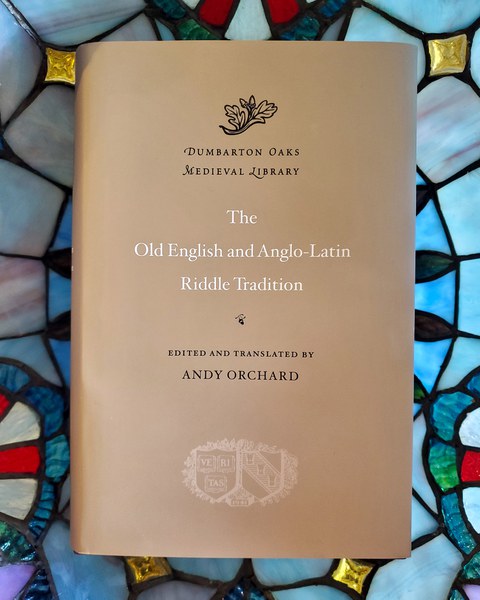By Ned Sanger
If you leaf through the Exeter Book, a tenth-century codex sparkling with jewels of Old English literature, then the small collection of merry riddles tucked between the more serious-minded ballads, elegies, homilies, and devotional poetry may seem like a skunk at the garden party. It surprised me, at any rate, like a section of dirty ballads in the middle of a hymnal would. And if you pause to read, what sort of riddles will you find? This sort:
A marvelous thing dangles by a man’s thigh,
under its lord’s clothing; ahead, a hole.
It is stiff and hard, stands in good stead,
when that servant lifts his own garments
over his knee; he wants to come upon
a well-known hole with that dangling head:
one he has often filled full-length before. (Exe 42)I heard that something or other was growing in a confined space,
swelling and surging, pushing up its covering;
on that boneless thing a bride took a grip,
proud in her hands, a lord’s daughter
clothed with a covering that bulging thing. (Exe 43)
The answers to those two stumpers would be, erm—a key and dough, respectively!
One of the recent additions to the Dumbarton Oaks Medieval Library, a volume entitled The Old English and Anglo-Latin Riddle Tradition, is all about these curiosities. (And if you peek in its Index of Solutions at the entry immediately following pen, you will see an alternative answer to the two riddles above. In fact, it’s listed as a possible answer to twenty-two separate riddles in the volume.) The book’s brief title expresses one of its basic principles: that the persistent habit of untwining the Anglo-Saxon riddles written in Latin from those written in Old English hobbles our understanding. There is one tradition, not two.
The Franks Casket, a small decorated chest from eighth-century England, demonstrates this fact nicely. Andy Orchard, who edited and translated the hundreds of riddles in the new volume, mentions in his introduction that on the casket’s front panel is engraved what is likely the earliest surviving riddle in Old English; its solution (hwæles ban, “whale’s bone”) is the material the object itself was made of. More importantly, he notices that the panels depict scenes from both Germanic and Roman history, and its inscriptions switch rather capriciously between the Latin alphabet and Old English runes. This already suggests it’s better to think of the two languages as comprising one bilingual tradition.
Orchard’s introduction provides further evidence of overlap between Latin and Old English writings. In an influential collection of riddles from late antiquity, one reads, “I bite the biters, yet of my own accord I bite no one.” More interesting than its silly solution (an onion) is how subsequent writers in medieval England adopted its rough formula—“I bite when bitten”—and then applied their cleverness to invent new riddles, both in Old English and in Latin. The volume contains over a dozen of their variations on this one theme, with solutions like “wisdom,” “greed,” “the wind,” and “a pair of bellows.” (The last of these also belongs to the naughty twenty-two with an alternate answer.)
Another bonus of the volume is that its notes clue the reader in on the history of the riddles, some of which are now millennia old. Take a crack at this one:
Strange to all is the hunt for wild creatures like us:
so that, if you were to capture anything, you’d refuse to bring it home,
and what you fail to capture, still you’d bring back with you anyway. (Sym 30)
To the extent that there was an official story in antiquity about how the poet Homer died, it went as follows. A group of fisher boys on the island of Ios posed a version of the above riddle to him, and he was so vexed by it that either he slipped, bopped his head, and kicked the bucket, or else he expired out of sheer exasperation that he could not solve it. The answer he never found was “lice.”
Most engagement with the Middle Ages today takes place indirectly, by means of books, movies, and TV shows that draw on the period in one way or another. Riddles tend to find a place in these: I think of the ones told by Bilbo Baggins in The Hobbit (“what have I got in my pocket?”), by the bridge keeper in Monty Python and the Holy Grail (“what is the airspeed velocity of an unladen swallow?”), and by Varys in Game of Thrones (about who, among a king, a priest, and a rich man, truly holds power). Orchard’s volume will naturally interest those curious about the practice that preceded these fictions. It should also tickle anybody with a taste for brainteasers and verbal shenanigans. And plucky puzzlers can tear their hair out trying to solve the volume’s few unsolved riddles, which have now been waiting a millennium for the shrewd reader who will finally shout “aha!”
Buy The Old English and Anglo-Latin Riddle Tradition and its companion, A Commentary on “The Old English and Anglo-Latin Riddle Tradition,” along with other DOML volumes at domedieval.org.
Ned Sanger was 2019–2021 postgraduate fellow in medieval literature at Dumbarton Oaks.

